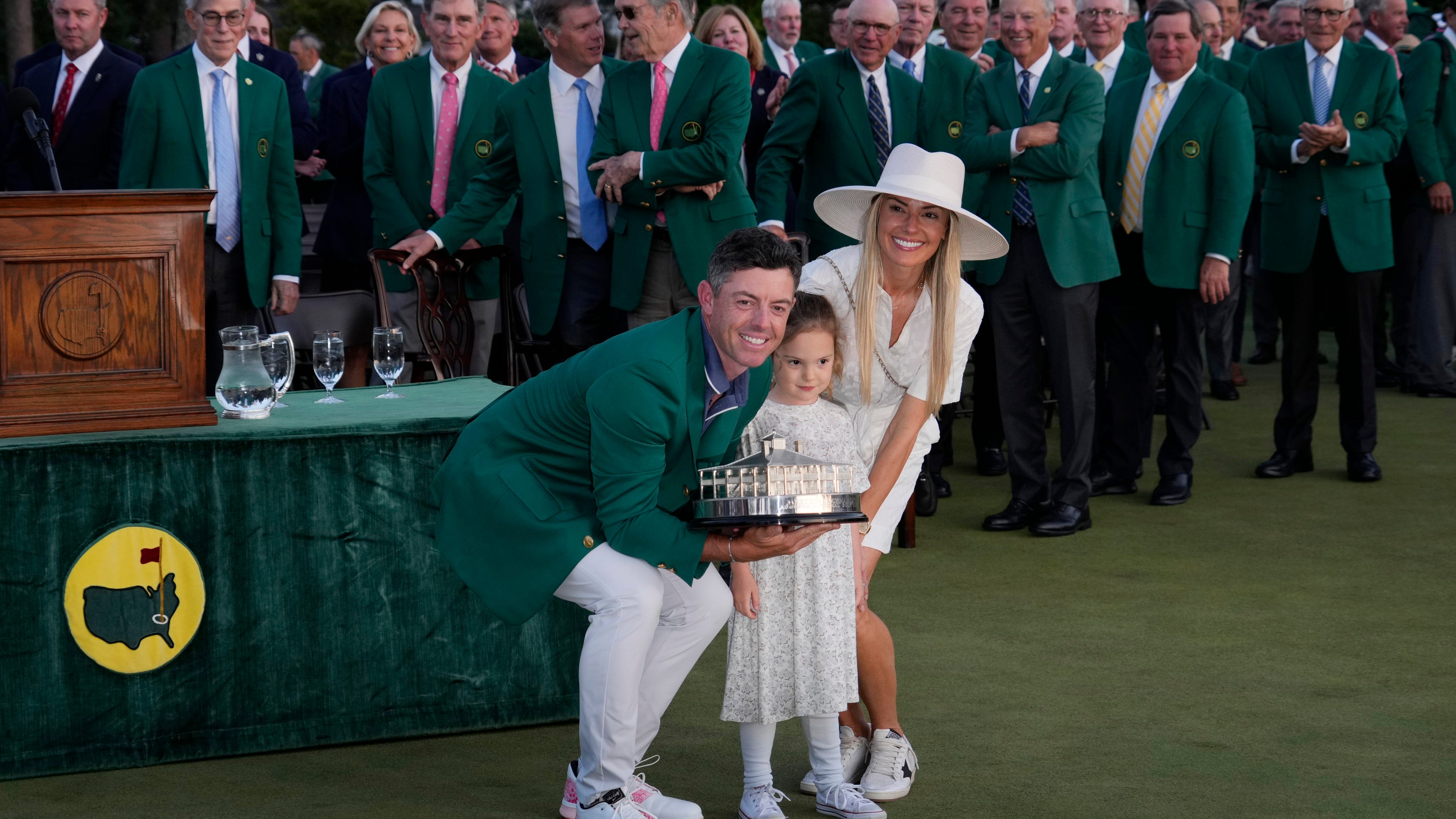Rory McIlroy wins the Masters and completes Grand Slam at Augusta
After 14 years of close calls and heartbreak, Rory McIlroy finally slips on the green jacket to complete the Grand Slam.
The Masters
AUGUSTA, Ga. — Three thousand nine hundred and twenty days is an awfully long time for stress to build up, for disappointment to coarsen the heart, for resilience to wither under sustained assault. That’s how long it’s been since that summer evening in Liverpool when Rory McIlroy won the third leg of the career grand slam, an at times agonizing wait that finally ended on a beautiful springtime evening in Augusta when he slipped into a green jacket and into history.
By the time he collapsed into the arms of friends by the clubhouse, the accumulated emotion was spilling out. When he finally emerged tearfully from the scrum, he ran his fingers through his hair and let out a guttural yelp of happiness. Then he broke into a wide smile.
“Right,” he said, “I have to go get a green jacket.”
Golf has no more dramatic stage than Augusta National on a Masters Sunday, and none more intensely claustrophobic than the second nine holes. The final round of this 89th Masters proved the truth in two cliches: that the tournament begins when competitors turn for home, and that major championship golf isn’t always a beauty pageant, that sometimes ugly wins the crown and garland.
The few hundred acres of Augusta National are the prettiest mortuary slab in sport, a perfectly manicured table upon which the world’s finest golfers are pitilessly examined for weaknesses not readily apparent, things that don’t show up on spreadsheets, like faint hearts and jangly nerves. Not even the man who left with the jacket was spared. A lengthy list of greats have been splayed and exposed here on the second Sunday in April, among them Greg Norman, Ernie Els, Johnny Miller and Tom Weiskopf. All proven winners in the less demanding precincts of major championship golf, but perennially came up short at the business end of Magnolia Lane.
When McIlroy lost a four-shot lead here in 2011, he was 21 years old, sufficiently young and carefree to win the very next major by eight, and another by the same margin a year later. Two more came in ’14, but that last one — the PGA Championship — was 3,899 days ago. Now he’s a few weeks shy of 36, older and grayer, but more resilient. He’s had to be given how he’s been calloused these past few years.
Three summers ago he wept on his wife’s shoulder when the Open got away from him in St. Andrews. Two summers ago it was the U.S. Open, owing to a poorly-timed error in the closing stretch in Los Angeles. Last summer was a gut punch, a couple short misses costing him the same major at Pinehurst. Which is to say there was plenty of scar tissue, but most was accumulated far from Augusta.
A few years ago, I chatted with McIlroy about Nick Faldo and noted that five of his six major victories came because his rivals stumbled. His three green jackets, I said (perhaps harshly), were handed to him by Raymond Floyd, Scott Hoch and Norman. McIlroy pondered that for a moment before replying with a wry laugh, “F—-, I wish someone would hand one to me!”
As it turned out, he didn’t need to have it handed to him. He didn’t win it cleanly, and in what was initially billed as a heavyweight bout with Bryson DeChambeau, it was McIlroy who was spitting teeth early. For a time it seemed he might hand it to someone, then it seemed he might hand it to someone else, but in the end he took it for himself.
“It was a heavy weight to carry, and thankfully, now I don’t have to carry it,” he said.
What McIlroy accomplished ranks among the most impressive feats in the history of this sport. Sure, we’ve seen a calendar year slam, a Tiger slam, astonishing feats of scoring. But no one in those moments achieved under the extraordinary pressure McIlroy withstood today — not just in the demands of navigating Augusta National, but in the merciless scrutiny of media (traditional and social), the weight of expectation (external and internal), the turning of the calendar barren year after barren year that left his apparent peak more distant in the rear view and his future seeming ever more limited. Time and again he put himself in position to have his heart broken, and it was. But not today. When he described himself as a more complete golfer after his win at The Players last month, this is what he meant. More than the shots, the approach, the attitude, the determination, the discipline, the belief that his day would come.
The statistics compiled at the Masters are rudimentary compared to the granular analysis each week on the PGA Tour. The final accounting will show the scores, the fairways and greens hit, the putts stroked. What all of that adds up to is an identikit picture of a man who stood up to pressure hitherto unseen in the history of golf, to criticism that was often as harsh as it was intense, to the toll of having his dreams dashed repeatedly. It will show a man who weathered the storm to prove himself the best golfer of his generation without losing perspective on the world around him.
He is everything this game needs, and finally this maddening, capricious, beautiful game gave him everything he needs, a jacket in 38 regular.





